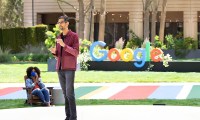It doesn’t seem very long ago that we were treated to Google Duplex and so much more at Google I/O 2018, but we’re already heading toward Google I/O 2019 — and fast. Google has announced the dates and location for Google I/O 2019, and the show is set to take place from May 7 to 9.
Unsurprisingly, the event will be held at the Shoreline Amphitheater in Mountain View, California — the same location of the past four Google I/O events and the place where the company has its headquarters. Last year, Google I/O was held from May 8 to 10, so the dates are also pretty much in line with what we would expect.
As is the case every year, Google announced the dates and location in the form of a puzzle, which still has yet to be solved. One Twitter user, however, seems to have been able to make their way around having to solve the puzzle at all.
Of course, Google usually offers a free ticket to Google I/O to the first person to crack the code, and considering the fact that it doesn’t seem like anyone actually has done that just yet, it’s possible the ticket could still be up for grabs. The puzzle seems to involve 11 clues, which are shown in a video on this website.
So what will we see at Google I/O? Well, as is usually the case, we’ll most likely see the next version of Android — Android 10.0 Q. Google usually goes through a number of new features in
On top of Android Q, however, we’ll likely also see Google update some of its other products. Increasingly in the last few years, Google has put an emphasis on Google Assistant, and that’s very likely to continue in 2019. Last year, we were treated to Google Duplex, and this year we’ll likely get updates on the rollout of the technology.




